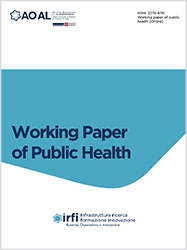The AR-ISS antimicrobial resistance surveillance system: an effective tool for improving antibiotic stewardship

All claims expressed in this article are solely those of the authors and do not necessarily represent those of their affiliated organizations, or those of the publisher, the editors and the reviewers. Any product that may be evaluated in this article or claim that may be made by its manufacturer is not guaranteed or endorsed by the publisher.
Objectives: to analyze antibiotic-resistance data collected at the Microbiology and Virology Laboratory of Azienda Ospedaliera SS. Antonio e Biagio e Cesare Arrigo of Alessandria between 2019 and 2020. Methods: over the last decades, bacterial resistance to antimicrobial agents increased world-wide until becoming one of the biggest public health challenges of our time, so that it is now listed by European Community as a special health issue covered by a the surveillance system, EARS-Net. In Italy, the AR-ISS antibiotic-resistance surveillance network, coordinated by the National Institute of Health, is an essential tool to study and describe its appearance and its spread. The system is based on a network of hospital laboratories throughout the national areas, which sends routine antibiotic susceptibility data to selected pathogens by invasive infections. Here, in the framework of the AR-ISS network, we present 2019 and 2020 annual surveillance reports regarding Azienda Ospedaliera of Alessandria. Results: we analyze the bacterial species under surveillance and compare data between 2020 and 2019. The European and Italian trends of the five-year period 2015-2019 for four drug/bug combinations is also evaluated. Particular attention has been paid for possible forecasts of antibiotic resistance. Conclusions: antibiotic resistance surveillance programs provide essential current and historical information for an appropriate antibiotic stewardship; possible forecasting of antibiotic resistance may be also useful for driving decisions about the mitigation strategies.
PAGEPress has chosen to apply the Creative Commons Attribution NonCommercial 4.0 International License (CC BY-NC 4.0) to all manuscripts to be published.

 https://doi.org/10.4081/wpph.2021.9299
https://doi.org/10.4081/wpph.2021.9299




